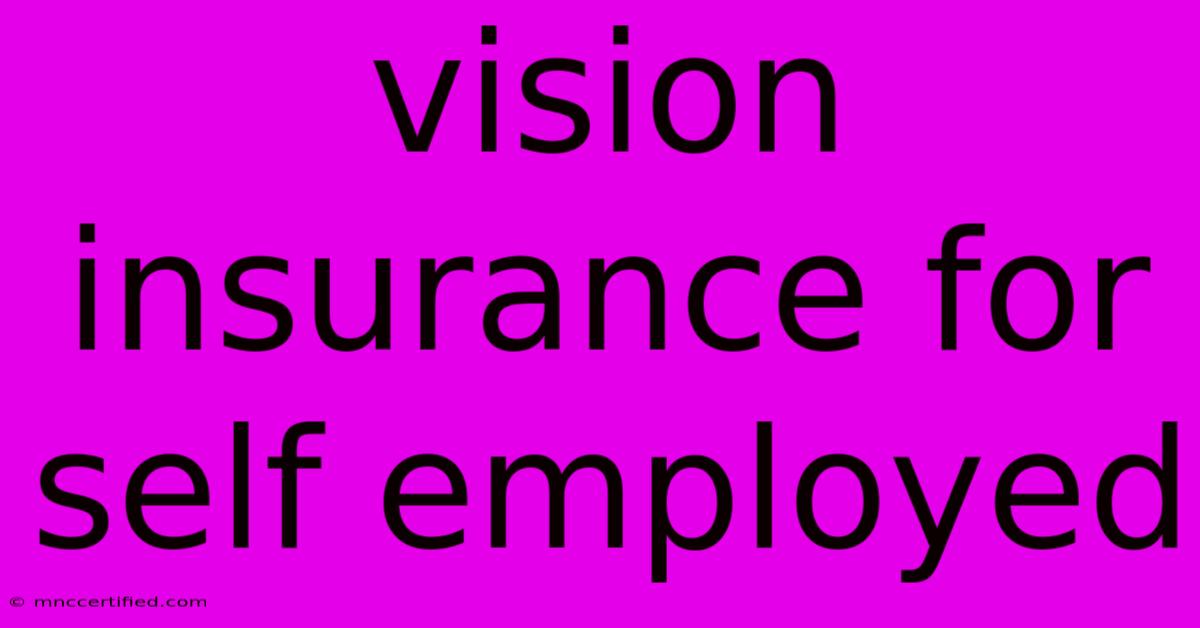Vision Insurance For Self Employed

Table of Contents
Vision Insurance for the Self-Employed: A Comprehensive Guide
Finding affordable and comprehensive vision insurance can be a challenge, especially if you're self-employed. Unlike employees who often receive benefits through their employers, you're responsible for securing your own coverage. This guide will walk you through everything you need to know about vision insurance for the self-employed, helping you navigate the options and choose the best plan for your needs.
Understanding the Importance of Vision Insurance
Regular eye exams are crucial for maintaining good eye health. Early detection of conditions like glaucoma and macular degeneration can significantly impact your treatment outcomes and overall quality of life. Without vision insurance, the costs of these exams, as well as glasses and contact lenses, can quickly add up. This is why securing the right vision insurance plan is a smart financial decision for self-employed individuals.
Key Benefits of Vision Insurance:
- Preventive Care: Regular eye exams are covered, helping to detect potential problems early.
- Cost Savings: Significantly reduces the out-of-pocket expenses for eye exams, glasses, and contact lenses.
- Peace of Mind: Knowing you have coverage for unexpected eye issues provides significant peace of mind.
- Access to Networks: Many plans offer access to a network of eye care professionals, often providing discounted rates.
Types of Vision Insurance Plans for the Self-Employed
Several types of vision insurance plans cater to the self-employed:
- Individual Plans: These plans are designed for individuals and offer varying levels of coverage. You can typically choose your own plan and provider. Keyword: Individual Vision Insurance
- Association Plans: Some professional organizations or associations offer group vision insurance plans to their members at discounted rates. Keyword: Association Health Plans
- ACA Marketplace Plans: The Affordable Care Act (ACA) marketplaces offer a range of vision insurance plans, some of which may include vision benefits as part of a comprehensive health insurance plan. Keyword: Affordable Care Act Vision Insurance
- Standalone Vision Plans: These plans focus solely on vision care, offering coverage for exams, glasses, and contact lenses. They're often more affordable than comprehensive health plans that include vision as a benefit. Keyword: Standalone Vision Plans
Factors to Consider When Choosing a Plan
Selecting the right vision insurance plan requires careful consideration of several factors:
- Coverage Levels: Compare the coverage levels for eye exams, frames, lenses, and contact lenses. Pay attention to what's covered and any limitations.
- Network Providers: Check if your preferred optometrist or ophthalmologist is included in the plan's network. Out-of-network benefits are usually less generous.
- Premiums and Deductibles: Balance the monthly premium cost with the deductible and out-of-pocket maximum. A lower premium might mean a higher deductible.
- Waiting Periods: Be aware of any waiting periods before you can access certain benefits, such as routine eye exams or lens replacements.
Finding the Right Vision Insurance Plan
Several resources can help you find the best vision insurance plan for your needs:
- Online Marketplaces: Websites dedicated to comparing health and vision insurance plans can help you find the best option based on your requirements and budget. Keyword: Online Vision Insurance Comparison
- Insurance Brokers: Independent insurance brokers can provide personalized advice and assist you in finding suitable plans.
- Professional Associations: Check if your professional association offers group vision insurance plans to its members.
Saving Money on Vision Care
Even with vision insurance, you can take steps to minimize your out-of-pocket expenses:
- Shop Around for Frames and Lenses: Compare prices from different optical retailers before making a purchase.
- Consider Contact Lenses vs. Glasses: The cost of contact lenses and glasses can vary significantly.
- Utilize Flexible Spending Accounts (FSAs): If your self-employment income allows, use a tax-advantaged FSA to cover vision care expenses.
Conclusion
Securing vision insurance as a self-employed individual is an essential step in protecting your eye health and financial well-being. By carefully considering the different plan options and factors discussed in this guide, you can find a plan that meets your needs and budget, allowing you to prioritize your vision health without unnecessary financial strain. Remember to regularly review your policy and compare options annually to ensure you're receiving the best coverage available.

Thank you for visiting our website wich cover about Vision Insurance For Self Employed. We hope the information provided has been useful to you. Feel free to contact us if you have any questions or need further assistance. See you next time and dont miss to bookmark.
Featured Posts
-
Texas Vs Arkansas Replay And Highlights
Nov 17, 2024
-
Bulls Utrgv Matinee Game Sunday
Nov 17, 2024
-
Colorado Vs Utah 2024 Football Preview
Nov 17, 2024
-
Ronaldo Hints At Retirement After Portugal Win
Nov 17, 2024
-
Ufc 309 Live Stream And Tv Details
Nov 17, 2024